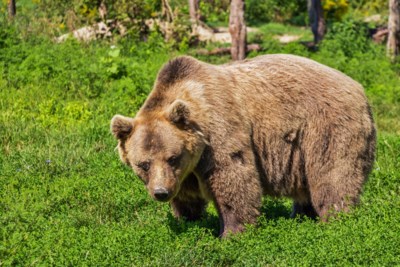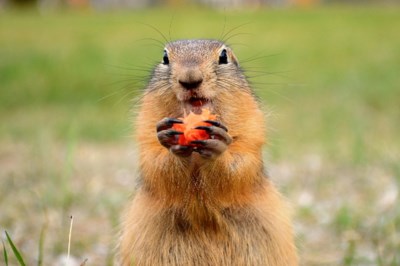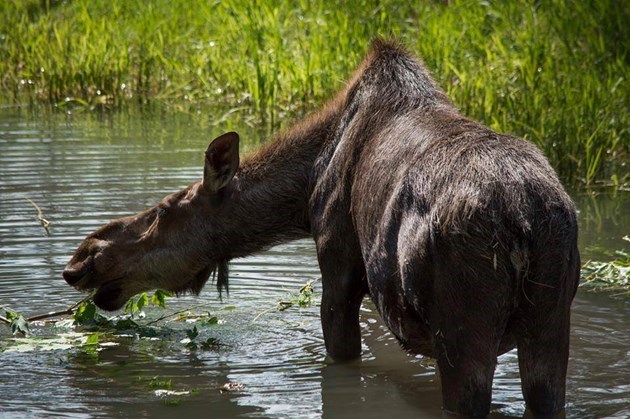After a couple of clear days, life for most of the humans in B.C. is returning to normal.
But for our feathered and fur-covered neighbours, the effects of wildfire season are hard to calculate.
Professors studying wildlife in Kamloops aren't sure what the impact will be after last year's record-breaking year of fires, followed by this year's second-place run.
Dr. Karl Larsen, whose focus is on mammals and reptiles, says the variety of factors to take into account, along with the inability to study the fires in a controlled setting, makes determining the positive or negative effects on the province's wildlife next to impossible.
 Bears often spend time in the spring munching on meadows. (via Bergadder/Unsplash)
Bears often spend time in the spring munching on meadows. (via Bergadder/Unsplash)"Fire research on wildlife is just hampered by how do you do controlled studies," he says. "They change the entire landscape; we're never going to do that experimentally.
"In some cases, it would be unethical to research it."
Other hindrances include smoke, evacuations and the fact scientists don't know what was happening in the area before the fire. In areas around Kamloops studied by researchers from Thompson Rivers University (TRU), populations of some animals can vary substantially for other reasons, so dropping into an area ravaged by fires without knowing what existed beforehand wouldn't be very useful.
One thing he says to keep in mind is how we define wildlife. Insects, rats, snakes, moose, bears and eagles are all wildlife, and all may be affected in different ways by a fire.
Another issue is how you decide negative impacts. Larsen points out something can be bad in the short-term, but offer long-term positive effects. The example he gives is for chipmunks.
"Fires are probably hell for chipmunks," he says. "But if you come back later, that fire has probably created the perfect habitat for chipmunks."Other species, especially smaller ones, might have a similar situation, where individual animals are negatively impacted but the overall situation is improved.
"Some of these fires move incredibly fast; people would have a hard time outrunning them," Larsen says.
There are also questions about how animals actually deal with the fires. He points out that while people might assume they run away from the flames, some animals could have other instincts.
"What does a badger do? Does it have the instinct to dig a hole way, way down?" he asks. "They do that when threatened by dogs."
A study in Australia got lucky. Scientists were studying a rodent called a bettong when fires broke out nearby and the animal burrowed to escape. While not all of them survived, a solid population did.
 (via Unsplash)
(via Unsplash)He also notes snakes were often some of the first animals to return after a wildfire in California, and the reason is unknown. Since they're not likely to climb trees, he posits they burrow to escape the heat, but there's no data to back that up. It would also be possible for some small mammals to burrow as well, and they're able to handle higher CO2 levels than humans.
However, it also depends on the needs of the animal. Larsen says red squirrels love the trees, and a fire that wipes out their main habitat would have a longer-term negative impact.
For larger mammals, like bears or deer, he figures in the case of smaller wildfires, the impact might be positive. They'd be able to escape the area around the fire, or double back around it, or even just out-wait the flames by hanging out in a lake. Larsen says he's seen pictures of caribou standing in rivers while a fire burns nearby.Once the flames are gone the environment is ripe for young plants, which herbivores eat. That could mean a bit of a boost in the herbivore population, which means predators hunting those animals would have more prey as well.
However, a larger fire, something in the tens of thousands of hectares could have a different effect, as fingers of the fire could cut off escape routes and devastate huge ecosystems.
"It really depends on what species your talking about (and) what timeframe you're talking about," he says.
Dr. Nancy J. Flood, another TRU professor who focuses on birds, says they have efficient lungs, so flying through the smoke, while not great, might not have as negative an effect as expected. And while birds use their eyes to migrate, it's not their sole navigational cue.
"Birds, in particular, use multiple cues to navigate (e.g., Earth’s magnetic field), and don’t just rely on vision or even smell," she writes in an email to KamloopsMatters. "In fact, since city lights are known to distract migrating birds and cause them to go off course, there may even be a small advantage accruing from all of this smoke in that respect."
She adds it's probably outweighed by the negative, but it's an example of the complex nature of nature.
One thing, in particular, should be noted, though, she says, and that is to remember the time frame nature can work on.
"Fire is a natural phenomenon, so birds and other animals have evolved to be able to cope with it to some extent," Flood writes. "Although the last two summers have been very smoky indeed, there have many decades during which smoke had perhaps been less than it would have been historically, due to our practice of fire suppression."


